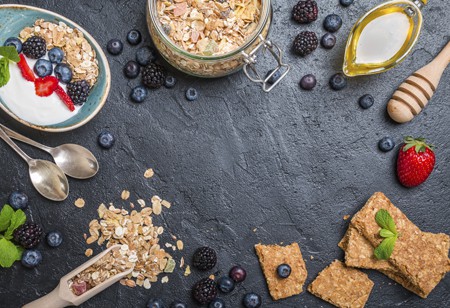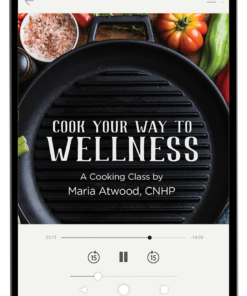When I was growing up, there was nothing like when my mom would bake her unbeatable chocolate cake. Each day, we’d only get one slice, along with a tall glass of really cold milk. Nirvana is the only way to describe each bite of this smooth, chocolaty treat. Oh so sweet and delicious. Yum!
Although my mom was very much into herbal remedies, gardening, and whole grain bread baking, looking back what’s really scary is that the cake was anything but what I now consider healthy—and as a matter of fact, it was poisonous! Yikes.
For some reason she would made this cake with nutrient-void white flour, vegetable oil, lots of white sugar, sweetened chocolate powder, and, yes, highly refined powdered sugar for the icing! The sweetness was way beyond what it should have been, and it’s no wonder we always craved more and anxiously wondered when the next slice would come.
Sugar addiction is not a myth—hundreds of worthy sources prove this fact. Here are just two of them:
“124 Ways that Sugar Can Ruin Your Health” by Nancy Appleton
“You’ve heard that sugar can suppress the body’s immune system, but did you know it interferes with the absorption of calcium? How about that it can cause food allergies, depression, and cancer of the breast, ovaries, and prostate? Or that sugar can reduce the good cholesterol in your blood and increase the triglycerides, two of the strongest indicators we have of heart disease risk? Despite the massive commercial campaign to paint refined sugar as harmless—or at worst merely ’empty calories’—hoards of scientific evidence indicate that it is far worse than that. In this startling list, Dr. Nancy Appleton documents 124 ways in which sugar has been scientifically implicated as a poison to human health, complete with 124 reputable references to back up her claims.”
—Selene River Press summary of “124 Ways Sugar Ruins Your Health”
From the Weston A. Price Foundation:
“The average American now consumes 175 pounds of sugar per year! That’s 46 teaspoons a day! If we pretend that sugar actually had some benefits, eating one-half pound every day would not seem like such a bad idea. But the truth is that sugar has absolutely no nutritional value whatsoever. Not only does it totally lack nutrients, but when you eat sugar it actually robs your body of nutrients–vitamins, minerals and even enzymes.”
Ample Proof
The evidence is abundant: hundreds of books, online articles, and even our allopathic doctors now agree that sugar in its refined state is truly toxic.
So let’s discuss healthier choices with one very important caveat. Even using the following recommended healthier sweeteners, it’s essential to consume them in moderation. Think of them as an occasional treat rather than part of your daily diet.
Sweets for Your Sweeties
Maple syrup: Maple syrup is rich in trace minerals, and it imparts wonderful flavor to baked goods, cream-based desserts, and, of course, pancakes and waffles. It has a delicious flavor and good chemical properties.
The most nutritious grade of maple syrup is what used to be called grade B or grade C. However, the grading system for maple syrup has since changed. The important thing to remember is that the darker the color, the higher concentration of nutrients it contains. Also, organic maple syrup is a safer food than commercial brands.
Molasses: The thick dark substance known as blackstrap molasses is produced from the third boiling necessary to extract table sugar from sugar cane. The nutrients refined out of the sugar cane remain in the molasses. The most nutritious form, unsulphured blackstrap molasses, has a very strong, rich flavor. It also has a low glycemic index and contains many minerals, including iron, calcium, zinc, copper, magnesium, and especially chromium, which is important for the maintenance of healthy blood sugar levels.
Sucanat: Sucanat is a generic name for evaporated cane juice. The best brand of sucanat is Rapadura because they stick to methods that retain the most nutrients. Rapadura is the best substitute for white or brown sugar in your cookies and cakes. It’s simply dehydrated cane sugar juice and has been used for thousands of years by the people of India. Be careful not to overdo it on the sucanat; eating too much can upset your blood chemistry every bit as much as white sugar. Also, don’t buy turbinado or other sugars labeled as “raw.” The nutrients in these products have still been removed. However, in a pinch you can use turbinado sugar with small amounts of molasses added back in.
Malted grain syrups: Malted syrups, usually made with barley, have been used for thousands of years, particularly in Asia. While malted syrups don’t contain much in the way of nutritional value, they offer a real alternative to other sweeteners in that they contain very little fructose, which is harmful in large amounts.
Note: If you have a compromised gastrointestinal environment, the following whole sweeteners may prove to be even better choices. Even when digestion is compromised or out of balance, they can still be fully absorbed.
 Raw honey: Be sure to seek raw honey from local producers if possible as local honey may help you thwart seasonal allergies. Raw honey is loaded with beneficial digestive enzymes. These enzymes are destroyed when the honey is heated above 117°F, so be sure to use raw honey in desserts that don’t require heating above that temperature. Also, don’t give raw honey to infants—young babies aren’t equipped with sufficient stomach acid to tolerate honey in its raw state.
Raw honey: Be sure to seek raw honey from local producers if possible as local honey may help you thwart seasonal allergies. Raw honey is loaded with beneficial digestive enzymes. These enzymes are destroyed when the honey is heated above 117°F, so be sure to use raw honey in desserts that don’t require heating above that temperature. Also, don’t give raw honey to infants—young babies aren’t equipped with sufficient stomach acid to tolerate honey in its raw state.
Stevia: Stevia is a sweet green powder made from a South American herb, and it can be used even by people who are sensitive to other whole sweeteners. Stevia is many times sweeter than sugar, so you need just a pinch to replace an entire spoonful.
Though Stevia doesn’t work very well in baked goods, it’s an excellent sweetener in salad dressings, smoothies, whipped cream, ice cream, puddings, and pie crusts. Take care to find organic green stevia powder. This is the unprocessed whole form of stevia leaf, unlike the processed white stevia powders and stevia liquids that are popular in health food stores.
Date sugar: Date sugar is made from dehydrated dates. Because it contains the amino acid tryptophan, which has a calming effect, it makes a good choice when making sweets for hyperactive children.
Date sugar doesn’t dissolve well, so it’s not as suitable for cookies and cakes. It does go very well with breakfast porridges and cream-based desserts where a little crunchy texture is delightful.
Coconut sugar and coconut nectar: Newly discovered sweeteners on the market are coconut sugar and coconut nectar. These low glycemic sweeteners are the ideal alternative to agave nectar, which has become very popular in alternative health circles but is actually a highly processed sweetener that’s manufactured in a manner similar to high fructose corn syrup. Coconut nectar in particular is similar in texture to malted grain syrups and can be used in place of maple syrup on pancakes and waffles.
A Few Sweetie Recipes
Sugar-Free No-Bake Coconut Cookies
—Adapted with permission from Nicole Eckman, RD
These cookies are a great way to get more coconut oil into your diet and also prevent a hypoglycemic event from coming on. Children love them, and they offer great antimicrobial properties to kids who have colds. They contain no sugar and therefore makes for a safe snack. If you get slightly nauseous when you eat them, it may be an indication that you have a gallbladder or bile issue that prevents you from digesting fat properly.
Special medicinal effect: Eat as a snack as soon as you are aware of a hypoglycemic event coming on, or in time to prevent one.
Ingredients
1½–2 cups unsweetened coconut flakes
2 tablespoon raw carob powder (optional)
½ cup coconut oil, slightly melted
¼ teaspoon vanilla extract
1 tablespoon organic almond or peanut butter (optional)
Instructions
- Pulse all ingredients in blender or food processor until creamy, stopping to scrape down the sides and bottom. If mixture is too dry, add 1–2 tablespoons coconut oil at a time to insure it doesn’t get too runny. (Dryness might also be caused by larger coconut flakes, so adjust amount if needed.)
- Line a cookie sheet with parchment paper (or use a stoneware cookie sheet, which requires no paper).
- Scoop a tablespoon (or a bit more) of dough into the palm of your hand. Squeeze into the shape of a small ball. The dough should be sticky enough to stay together. Place coconut ball onto cookie sheet and flatten gently into round “cookies.” Store in fridge or freezer until solid. These no-bake cookies may usually be left on the counter after they’ve been frozen (depending on the heat in your kitchen).
Peanut Butter and Raw Honey Sandwich
Many of us have become used to making the ole American peanut butter and jelly sandwich, but maybe it’s time for a healthier option. Jelly is packed with sugar, and it’s anything but healthy for your child. Raw honey, on the other hand, comes to you nature- made with a ton of great nutrients.
“According to Dr. Ron Fessenden, MD, MPH, the average American consumes more than 150 pounds of refined sugar, plus an additional 62 pounds of high fructose corn syrup every year. In comparison, we consume only around 1.3 pounds of honey per year on average in the U.S. According to new research, if you can switch out your intake of refined sugar and use pure raw honey instead, the health benefits can be enormous.”
—“The Many Benefits of Raw Honey,” Dr. Axe
Ingredients
2 thin slices of homemade sourdough einkorn bread
1 tablespoon organic peanut butter
1 tablespoon organic raw honey
1 teaspoon raw butter
Enjoy with a tall glass of cold raw milk. Read why in my blog post “Raw Milk Awakening.”




Excellent info about sugar, Maria! Everyone needs this info. Thank you!